10 Benefits of Doggy Daycare (Based on Science)
Updated on
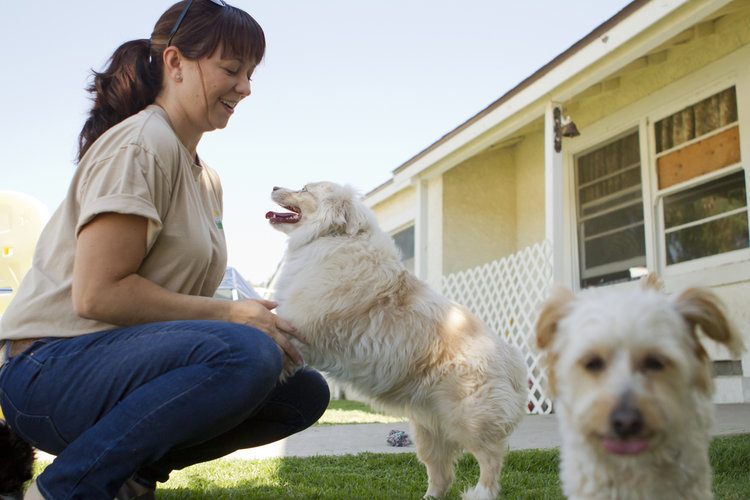
Many parents place their young children in daycare so that their children can be looked after and stimulated throughout the day. The same is true for dogs, and that is why doggy daycare exists. There are many benefits to enrolling your dog in daycare—for both the pet parent and the dog. For some, it could be the only solution, especially if they have to be away most of the day working.
Of course, there are pros and cons to everything, and while this is a wonderful idea, it is also costly. We’re going to look at all the benefits of dog daycare and touch on some reasons why it may not be the best option for you or your dog so that you can make a truly informed decision that will suit your individual dog’s needs best.
The 10 Benefits of Doggy Day Care
1. They’ll Be Supervised
A major stress factor for some pet parents is leaving their dogs at home alone. As much as you can section off areas of your home to keep your dog safe, if you’re not there to watch them, there is no guarantee that they won’t chew into something they shouldn’t, choke on one of their toys, hurt themself while playing, or try to break out of the area you’ve sectioned off for them.
With daycare, you will have peace of mind that they are being looked after, are receiving the love and care they deserve, and are at less risk of injuring themselves or causing an accident. You also won’t feel like you need to drive home to check on your dog during every spare second you get because the facilitators are trained and will communicate with you if anything concerning arises.
2. They’ll Have Company
Most dogs are quite social, and although they love being with you, they also enjoy interaction with other dogs. They also get lonely when left alone for long periods, which can be a problem if you don’t work from home. Getting a second dog is a great idea, but it’s not always the best solution because some pet parents don’t have the space, money, or time for a second dog.
Thankfully, dog daycare provides your dog with companionship, where they’re able to play, interact, and learn from other dogs. They’ll also be fussed over by the staff, which most dogs enjoy.
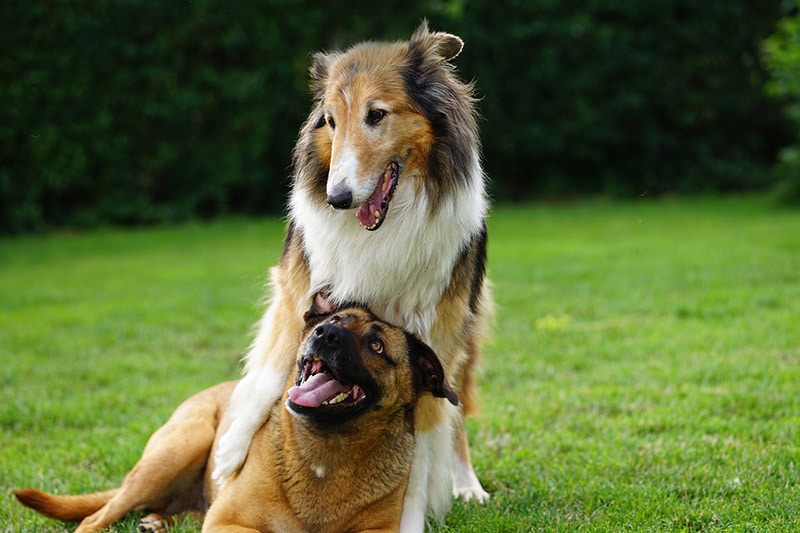
3. It’s a Great Way to Socialize Your Dog
A well-socialized dog will be able to play and interact with other dogs and people, but a dog that hasn’t been properly socialized from a young age will feel fearful and anxious around others and could lash out, causing injury to the other pet or themself. Thankfully, it is never too late to socialize your pooch.
Dogs that start dog daycare from an early age benefit because their social skills will be naturally developed, which will help them feel relaxed around other dogs and people and contributes to their friendly, happy nature. If your dog hasn’t been socialized well, chat with the owner of the dog daycare, as they can work with you and your dog to make them feel more comfortable and ease them into the group safely.
4. They’ll Get Daily Exercise
Dogs that stay at home alone all day usually aren’t getting the exercise they need and might start to display negative behaviors because of all their built-up energy. When you get home from a long working day, you may only have enough energy or time for a quick walk around the block and maybe a run or hike on the weekends. Although those daily walks are helpful, they may not be enough for your dog, depending on the breed, as some breeds need around 2 hours of exercise per day.
Most dog daycare facilities have agility courses, shallow swimming pools, and large, open spaces that are securely fenced off to allow your pup to run freely and release the energy they have. They’ll also be playing with the other dogs and releasing their energy that way. Along with your daily walk, your dog will be at a reduced risk of becoming obese and will be in a healthier position mentally and physically for it.
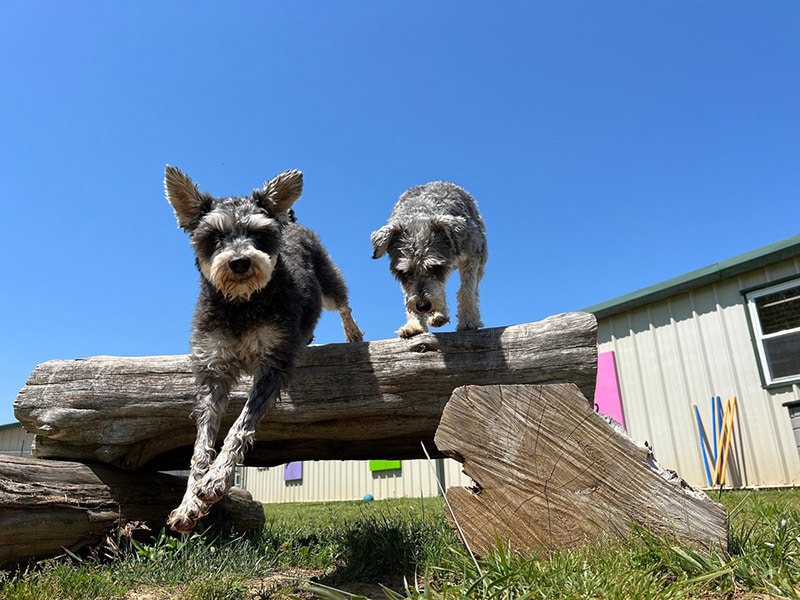
5. They’ll Be Trained
With little time on your hands, you might be struggling to achieve the standard you want with your dog when it comes to training. They might be great in one area and terrible in another. Training takes time and patience, and you may need a little extra help.
This is where dog daycare can step in and help. Many facilities offer dog training at an additional cost, but it will allow your dog to be trained by someone they already know and trust instead of a whole new trainer that you may end up hiring to help your dog in certain areas anyway. You can opt for one-on-one training or group training, depending on your dog’s needs and what they need polishing up on.
6. They’ll Be Mentally Stimulated
If your dog is getting plenty of physical exercise but still has behavioral issues, they might be lacking when it comes to mental stimulation. Dogs are intelligent and benefit from using their minds. There are several ways to mentally stimulate them, and they’re probably a lot less complicated or taxing than you might imagine.
At dog daycare, your dog will be mentally stimulated. It’ll happen through wandering around the facility and sniffing the environment and other dogs, through playing outside and watching the birds fly overhead, and through the training sessions your dog has, as well as the games the facilitators play with your dog while they’re in their care.
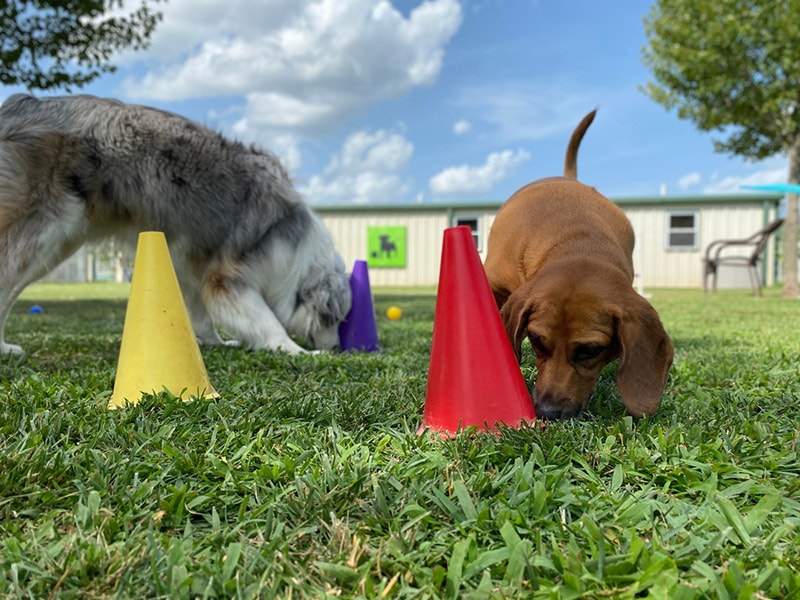
7. It Relieves Separation Anxiety
It’s tough when your dog has separation anxiety because there will be times you have to leave them home alone. After a few hours of being out of the house, you may come home to complaints from your neighbors because your dog spent that duration excessively howling, whining, or barking. You may walk into your living area to find it ripped apart or find that your dog broke house training and toileted in areas they shouldn’t have.
You may even notice less obvious signs, such as trembling, not eating, pacing, or self-injury. Thankfully, separation can be relieved by dog daycare, as they’ll be kept busy through play, exercise, and mental stimulation and won’t have any time to worry about your absence. They’ll have constant company, which will eliminate destructive behavior and help your dog feel less anxious since they won’t be on their own.
8. It Provides Routine
Believe it or not, dogs thrive off routine. They like to know what to expect and be able to anticipate what will be happening next, as it gives them confidence. Your day doesn’t have to be planned from start to end for your dog to be happy, but having consistency, like eating around the same time every day or going to dog daycare, for example, can help reduce their anxiety.
At daycare, routine will be further implemented into your dog’s day, as they often tend to feed, groom, train, or walk your dog at set times.
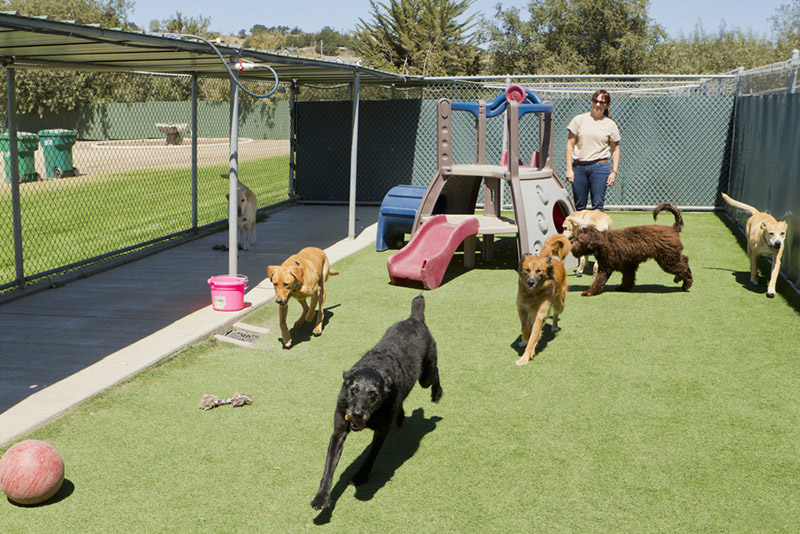
9. It Allows More People to Adopt Dogs
One of the main reasons why people who want a dog don’t get one is because they don’t think it’s fair to leave their dog on their own all day while they’re pursuing their careers. Other reasons are that they don’t have enough time in the day to exercise their dog or because they don’t have the type of home or yard that is suitable for leaving a dog alone without them being there with them.
Dog daycare is a great opportunity for dog lovers who have the above concerns because their pet will be in the company of other dogs and people while they’re at work, they’ll get plenty of exercise, and they’ll be in a safe and secure environment.
10. You Don’t Have to Have Strangers in Your Home
Another option that people may prefer instead of taking their dog to a daycare is hiring a dog sitter to stay with their pet all day or for a few hours. This option is better for some pets, especially if they don’t get on well with other dogs.
The only downside is that you will have to let a stranger into your home and trust that they’re looking after your dog the way they should be, without any actual accountability. Even if that pet sitter has wonderful references to back up their work and experience, you may feel slightly uncomfortable with the idea; it simply depends on your preferences.

Why Dog Daycare May Not Be Ideal for You and Your Dog
There are many benefits of dog daycare, but each dog is different, and what works well for one may not be the answer for another. Dog daycare also may not be what you’re looking for due to your lifestyle or even your budget.
1. It’s Costly
Doggy daycare isn’t free, and you will have to pay quite a bit for it every month. If you don’t have the extra money to cover these costs, it might be better to look into a few alternatives.
You could consider asking a family member to look after your dog while you’re at work, you could take your dog to daycare twice a week instead of every day, or you could make the trip home during your lunch break to walk your dog and make sure they are fine if you don’t live too far away.
2. Your Dog Could Be Exposed to Illnesses
A risk you’ll need to consider is that your dog could be exposed to all sorts of illnesses while being at a dog daycare, so it’s important to choose a facility that requires all their dogs to be vaccinated and to stay at home if they show signs of illness. However, they may still pick up parasites from being kept together and playing in the same playgrounds.
Another risk is injury. It is bound to happen at some point because accidents do happen when a group of dogs are placed in the same environment, but they should not happen frequently.
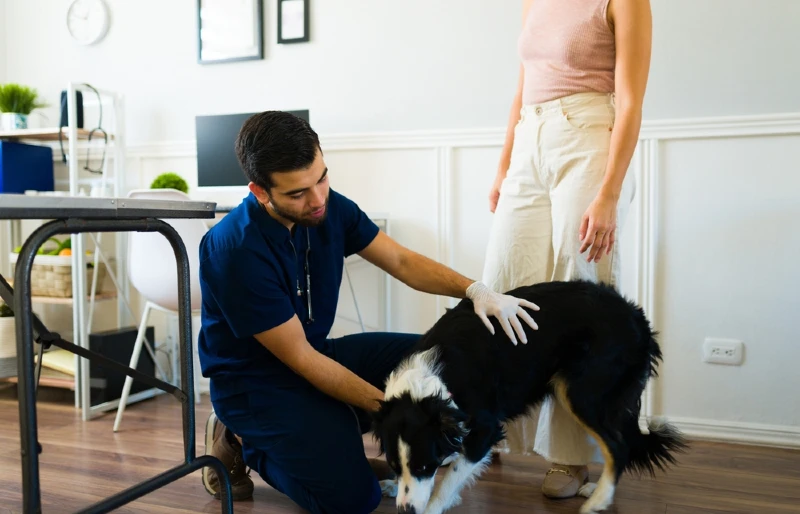
3. Your Dog Doesn’t Get on With Other Dogs
Dog daycare provides the opportunity for dogs to socialize and develop confidence through routine, but there are some dogs who simply don’t enjoy being around other dogs. If this is true for your dog, or they become very anxious in different, loud environments, you may need to consider getting a pet sitter instead.
4. Your Dog Won’t Have Constant Individual Attention
As much as there are benefits of having a number of dogs placed together under the care of daycare staff, there isn’t going to be one staff member per dog, which means that your dog won’t have constant individual attention. They may get it every now and then or during training, but for the most part, their attention will be divided.
If you want your dog to have constant individual attention due to health concerns or whatever other reason, you may need to hire a pet sitter to look after your dog during the day, as they won’t have other pets to worry about. However, it may work out to be more expensive than daycare.
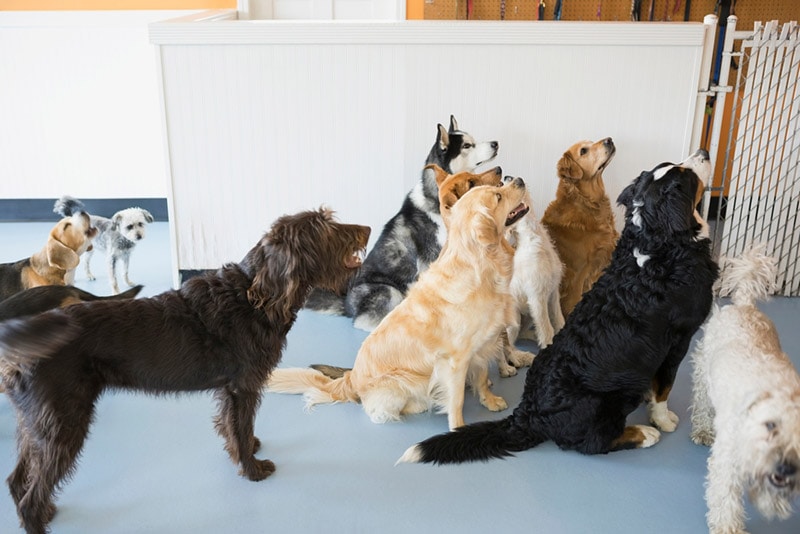
Conclusion
If you have the means and your dog is comfortable with being at a doggy daycare, it is an excellent service to consider. It can benefit dogs mentally, physically, and emotionally, relieving them from separation anxiety and putting a stop to destructive behaviors. You can also opt for your dog to be trained while they’re there and have peace of mind that they’re being supervised and cared for.
However, it isn’t for every dog, and some dogs may do better in their own environment with minimal noise. In these cases, you could ask a family member to look after your dog during the day or hire a pet sitter.
Featured Image Credit: Jayme Burrows, Shutterstock













